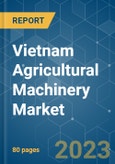Key Highlights
- Vietnam is one of the Southeast Asian countries, which depends on agriculture as the state’s primary source of income. The agriculture sector represents 14% of the GDP and employs around 36% of the nation’s workforce, according to a World Bank study of 2020. The factors that are driving this market are population growth, urbanization, and higher productivity demand with the shrinking agricultural land, which have led to the growth in demand for agricultural machinery.
- According to FAO, rice, maize, soybeans, sugarcane, sesame seeds, cassava, beans, banana, pepper, and many others are the major crops produced in the country. In 2021, rice production accounted for the highest yield volume among main crops in Vietnam, amounting to just under 43.9 million metric ton, followed by the yield volume of cassava amounting to around 10.7 million metric ton. In that year, the yield for rice increased by approximately 2.6 percent compared to the previous year.
- Most than 70% of the cultivated area under Vietnam is mechanized. To make this expensive machinery affordable by farmers, the government is implanting supporting schemes. This is one of the major factors driving the growth of the market. Custom hiring of agriculture machinery can be observed in Vietnam as the local production of agriculture machinery is low. Agricultural co-operatives and private enterprises are the providers of machinery for hire. Organizations that offer hiring services have efficient machinery in tillage, harvesting, threshing, drying, storage of grains, and transportation. These organizations are concentrated especially in Mekong River Delta and Red River Delta.
Vietnam Agricultural Machinery Market Trends
Increasing Farm Mechanization with Shortage of Labor
According to the Ministry of Agriculture and Rural Development in 2020, the level of mechanization in agriculture is increasing in the pre-and post-harvest stages. Specifically, the rate of mechanization of agricultural land preparation reached 94%, 42% of sowing and planting care reached 77% and that of rice harvest reached 65%.Vietnam is facing an acute shortage of labor in agriculture with the population shifting to construction and other fields expecting better income. This has been a crucial factor in the increased use of machinery across various processes. The shift in occupational structure from agriculture to different sectors is mainly occurring in the four regions: The Red River Delta, the North Central and the Central Coastal areas, the Mekong River Delta, and the South East. Shortage of seasonal agriculture labor is the major driver for the implementation of machinery in agriculture, as the work of laborers can be replaced with machines.
According to the Ministry of Industry and Trade, in 2019, the number of tractors across the country increased by about 48%, combine harvesters increased by 79% and agricultural dryers increased by 29%. The farm power availability reached about 2.4 HP/ha cultivated. However, Vietnam is still far behind the average level of equipment for agriculture when compared to Thailand with four HP/ha, China eight HP/ha, and Korea 10 HP/ha.
Row Crop Tractors Dominate the Market
With the rising unavailability of farm laborers and the growing farm mechanization of agriculture, the demand for row-crop tractors boosts the sales of the Vietnam agricultural machinery market. The increasing demand for low power under limited arable land, precision, handling, and efficiency has shaped the development of the modern planter tractor, and it continues to drive the development of these tractors.The row-crop tractor is specifically tailored to grow crops that meet all agricultural demands, such as ploughing, harrowing, leveling, pulling seed drills, weed control, and running various machines, like water pumps, and belt pulley threshers. These tractors are provided with replaceable driving wheels of different tread widths. They have a high ground clearance to save crop damage. In terms of consumer preferences, sales for 4W tractors are growing faster than that of 2W but the latter has the dominant market share in terms of volume. The low price of two-wheel tractors makes them a great choice for small-hold farmers who own small pieces of land. Technological advancement for developing more efficient products, while keeping in mind the country-specific requirements, will provide opportunities for the future growth of the sector.
Vietnam Agricultural Machinery Industry Overview
The agricultural machinery market in Vietnam is moderately consolidated with few players cornering the majority of the market share. New product launches, partnerships, and acquisitions are the major strategies adopted by the leading companies in the market, in the country. Along with innovations and expansions, investments in R&D and developing novel product portfolios are likely to be crucial strategies in the coming years. Kubota, CLAAS KGaA mbH, Yanmar, Iseki, CNH, and VEAM are the largest companies that provide agricultural machinery in the Vietnamese market. The major players are ready for investment and various companies are adopting different strategies to increase their market presence in this market in Vietnam.Additional Benefits:
- The market estimate (ME) sheet in Excel format
- 3 months of analyst support
This product will be delivered within 2 business days.
Table of Contents
Companies Mentioned (Partial List)
A selection of companies mentioned in this report includes, but is not limited to:
- Kubota Corporation
- CLAAS KGaA GmbH
- Vietnam Engine and Agricultural Machinery Corporation (VEAM)
- Yanmar Vietnam
- Vietnam Agrotech Co., Ltd
- CNH Industrial
- ShanDong Huaxin Machinery Co. Ltd.
- Iseki Corporation
- Truong Hai Auto Corporation (THACO)
- Tong Yang Moolsan Company Limited










